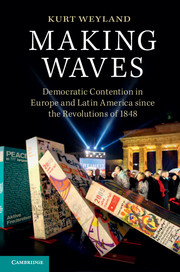Crossref Citations
This Book has been
cited by the following publications. This list is generated based on data provided by Crossref.
Gunitsky, Seva
2014.
From the Spring of Nations to the Arab Spring: Building Better Typologies of Democratic Diffusion.
SSRN Electronic Journal,
Lawson, George
2015.
Revolutions and the international.
Theory and Society,
Vol. 44,
Issue. 4,
p.
299.
Lawson, George
2016.
Within and Beyond the “Fourth Generation” of Revolutionary Theory.
Sociological Theory,
Vol. 34,
Issue. 2,
p.
106.
Weyland, Kurt
2016.
Patterns of Diffusion: Comparing Democratic and Autocratic Waves.
Global Policy,
Vol. 7,
Issue. 4,
p.
557.
Owen, John M.
2016.
Springs and their offspring: the international consequences of domestic uprisings.
European Journal of International Security,
Vol. 1,
Issue. 1,
p.
49.
Hess, Steve
2016.
Sources of Authoritarian Resilience in Regional Protest Waves: The Post-Communist Colour Revolutions and 2011 Arab Uprisings.
Government and Opposition,
Vol. 51,
Issue. 1,
p.
1.
Schedler, Andreas
and
Hoffmann, Bert
2016.
Communicating authoritarian elite cohesion.
Democratization,
Vol. 23,
Issue. 1,
p.
93.
Linebarger, Christopher
2016.
Dangerous lessons.
Journal of Peace Research,
Vol. 53,
Issue. 5,
p.
633.
Roberts, Kenneth M.
2016.
Democracy in the Developing World: Challenges of Survival and Significance.
Studies in Comparative International Development,
Vol. 51,
Issue. 1,
p.
32.
WEYLAND, KURT
2016.
Crafting Counterrevolution: How Reactionaries Learned to Combat Change in 1848.
American Political Science Review,
Vol. 110,
Issue. 2,
p.
215.
Tosun, Jale
and
Croissant, Aurel
2016.
Policy Diffusion: A Regime‐sensitive Conceptual Framework.
Global Policy,
Vol. 7,
Issue. 4,
p.
534.
Fishman, Robert M.
and
Coshow, Suzanne M.
2017.
The Cambridge Handbook of Sociology.
Weyland, Kurt
2017.
Autocratic diffusion and cooperation: the impact of interests vs. ideology.
Democratization,
Vol. 24,
Issue. 7,
p.
1235.
Osorio Gonnet, Cecilia
2017.
Global Encyclopedia of Public Administration, Public Policy, and Governance.
p.
1.
Pérez-Liñán, Aníbal
and
Polga-Hecimovich, John
2017.
Explaining military coups and impeachments in Latin America.
Democratization,
Vol. 24,
Issue. 5,
p.
839.
de la Torre, Carlos
2017.
Hugo Chávez and the diffusion of Bolivarianism.
Democratization,
Vol. 24,
Issue. 7,
p.
1271.
Nieto-Matiz, Camilo
and
Schenoni, Luis Leandro
2017.
Backing Despots? Foreign Aid and the Survival of Autocratic Regimes.
SSRN Electronic Journal,
Porto de Oliveira, Osmany
2017.
International Policy Diffusion and Participatory Budgeting.
p.
3.
Altman, David
2018.
Citizenship and Contemporary Direct Democracy.
Osorio Gonnet, Cecilia
2018.
Global Encyclopedia of Public Administration, Public Policy, and Governance.
p.
1.





